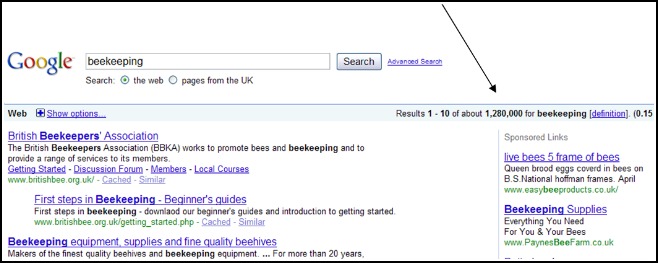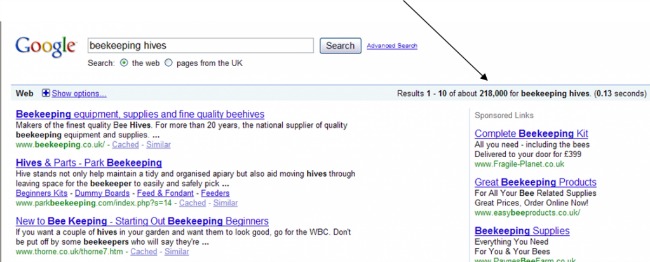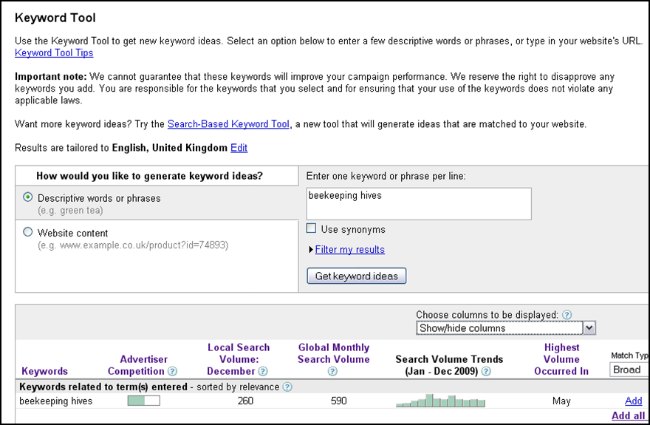At one time, it was standard practice to choose a domain name that matched your brand or your business name. This strategy is great if people know you or your brand and will therefore tend to type it as a keyword / search term in a search engine.
Unfortunately, in the majority of cases, you are an ‘unknown’ – a business or organisation still looking to establish a name for yourself in your chosen niche or market. You may have a fantastic looking website or blog with wonderful products & solutions but if people don’t find it, unless you only want to use it as a reference tool, it will not fulfil the purpose for which it was created.
Having the right domain name can significantly improve your chances of appearing on first page search engine results
When choosing a domain name, in the longer term it pays to do first do some quality research to see what words or phrases you could use in your domain name to help you attract ‘organic traffic’ from search engines which is FREE, in otherwords get onto the first page of search engine results (e.g google, yahoo, bing etc) so that people find you!
But what if you already have a domain name? No problem, still use the process below to choose the best new one you can find & then redirect your current site to the new domain. (If you are not sure how to do this, your web host should be able help). Existing people who know you / your site, will then still get to you if they use your old domain.
Let’s get started by using the example ‘beekeeping’
When someone enters a word or phrase into the google search box and clicks search, on the right-hand side, the information that appears (as indicated by the arrow shown on the diagram), is the number of website / blog pages that are competing for the first page rankings on google. In this case the word ‘beekeeping’ has over £1.2 million competing pages.

With volumes like this, competing for a page 1 position will be hard, so you need to consider going a little ‘deeper’.
Let’s say you already, or are considering specialising in beekeeping hives. The next screen shot shows you the results you get just by adding the word hives – as you can see, the number of competing pages has now reduced down to 218,000 !

This is a significant difference!
On the face of it, it would seem to be sensible to consider a domain name such as: www.beekeepinghives.com however we still have something else to check…
Is there a reasonable number of people searching the search engines for your phrase?
Google offer a FREE keyword research tool called Google External Keyword Tool. (Just type it into google to get a link – you don’t have to be a registered google account user).
Unless you change the settings, then the results will be tailored to the country you are based in.
Here are the results for the phrase ‘beekeeping hives’:

- There were 260 in the month of December 2009 in the UK alone and 590 searches globally.
- It shows us that there are searches throughout the year and May and August are typically peak months.
Whether this search volume is good enough, will depend on your product or service and the location of your target market.
Profit Masters recently carried out this exercise for a client who is a Drum Teacher. He was looking to create a blog to boost student numbers. He selected a keyword phrase to use in his domain name which had a predicted local search volume of 140 per month. For him this was plenty. His ability to sell his ‘service’ is limited by the number of hours he is willing to spend teaching, so he was happy to work on aiming to attract and convert 1-2% a month of this volume. Read his Case Study.
To summarise, choose a keyword phrase to use as, or in your domain name which:
- Clearly represents your niche or product
- Has a low number of existing competing web pages or blog pages but…
- Still has a good volume of people searching for it in relation to you & your sales strategy
Good luck with your research !







Leave A Comment
You must be logged in to post a comment.